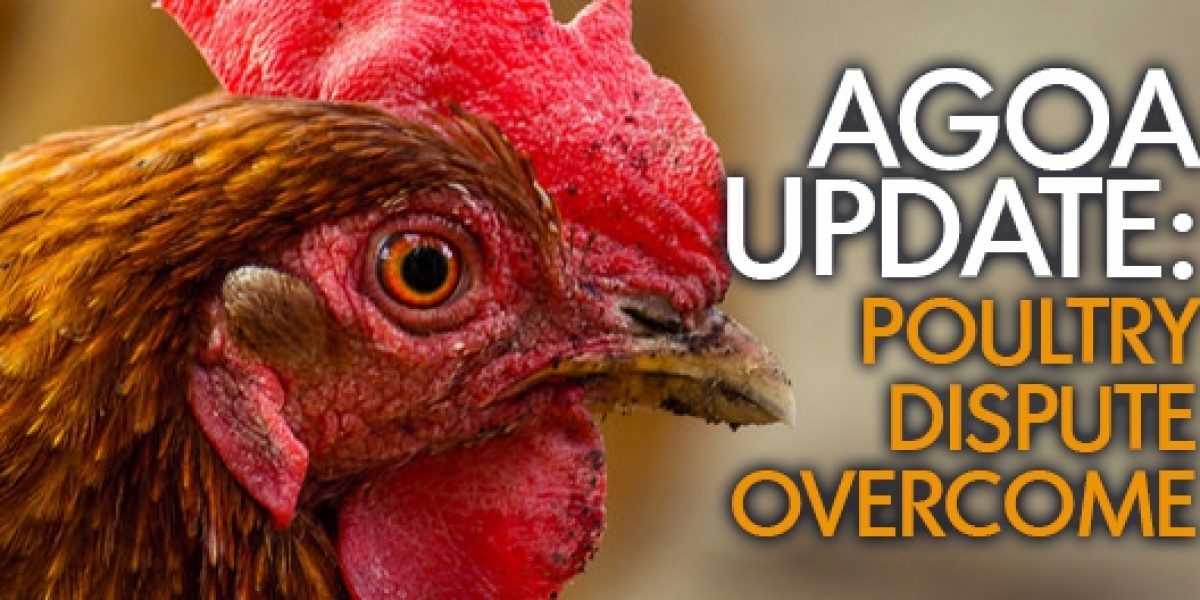AGOA, which creates over 62,000 jobs in South Africa alone, expires on 30 September 2015, and its renewal has been stuck in a controversial standoff between the US and South Africa. The bill must still be debated, and will need to pass through a hostile Senate that is insistent on extracting concessions from South Africa, but the initial text offers various clues on the direction the final legislation will take.
South Africa Included, For Now
The renewal of AGOA has primarily been held up by complaints against South Africa’s blocking of poultry imports from the US.
South Africa maintains anti-dumping measures against certain chicken pieces. These brown-meat chicken pieces are unpopular in the US market, and it is claimed that US firms treat them as a waste product, unloading them at any price, while making their money on more popular white-meat pieces. US producers therefore allegedly dump their goods in South Africa, selling them at less than the cost of manufacturing, and threatening South African producers who cannot compete with this unfair trade.
The US strongly denies the allegations, and the difference between the two sides centres on how you divide up a chicken. The cost of producing poultry is calculated on the whole chicken, but when this chicken is cut into pieces, the costs must be divided among those pieces. The two sides use different methods to assign costs, creating an intractable difference of opinion on the cost of producing a drumstick.
The dispute found its way into the AGOA debate via the Senate Chicken Caucus, led by Senators Johnny Isakson and Chris Coons. The Caucus has a history of lobbying hard for the American poultry industry, including taking the lead on previous trade disputes with China and India. With the support of a range of other senators, they have threatened to block South Africa’s inclusion in AGOA unless the dispute is resolved. Crisis talks with the Department of Trade and Industry have been ongoing to resolve the impasse, although the bulk of discussions have been conducted by the two industry groups on either side of the divide: the US Poultry and Egg Export Council and the South African Poultry Association.
For now, South Africa is included in the draft renewal and no mention is made of the poultry dispute. However, the new bill gives President Obama greater power to review countries’ eligibility for AGOA preferences, and changes the process by which this happens.
Currently, the process is driven by American embassies, which report on the progress of their respective African countries towards meeting various AGOA eligibility requirements, such as respecting the rule of law and making progress towards removing barriers to trade with the US. This happens on a semi-regular basis, the embassies’ recommendations are generally accepted, and countries have only ever been suspended for political reasons, like a coup or undemocratic practices.
In the new bill, any interested party is able to submit petitions on a country’s eligibility for AGOA, there is new scope to have public hearings in the US on these issues, and eligibility may be reviewed by the President at any time. This would give scope to a body like the USA Poultry and Egg Export Council to petition for a review of South Africa’s eligibility based on the chicken dispute, and for this to spark a US government review of the country’s eligibility at any time, with public hearings on whether South Africa should remain in AGOA.
While these expanded enforcement powers might be enough to overcome the dispute, Senator Isakson is calling for stronger measures, namely for South Africa to be placed on a three-year probation period with regular reviews of the country’s eligibility. It’s unclear how much support exists for the three-year probation period, but it looks set to be at the centre of the poultry dispute when the bill makes it to the Senate.
Ten Years, Export Strategies, and LDC Cotton
Looking beyond the poultry dispute, the new AGOA offers a lot of good news, with three particularly promising developments.
First, the bill extends AGOA for a period of 10 years. This is less than the 15-year extension that was publicly called for by the Africa group, but it is widely believed that the 15-year call was a negotiating tactic to reach an eventual compromise of 10 years. A longer renewal period is vital to enable African states to attract investors, who require a guarantee that AGOA access will remain in place long enough to repay their initial investment.
Second, the bill accepts the recommendations of the Government Accountability Office that export strategies be drafted by African countries to improve the use of AGOA. Currently, the vast majority of African countries either export little to the US, or export a very undiversified bundle of natural resources. The bill offers the prospect of expanded support in drafting plans to promote diversified African exports to the US.
Third, the bill gives President Obama scope to include cotton products in the list of AGOA preferences available to Least Developed Countries. Cotton is an extremely politically sensitive sector in the US, and imports generally face very high trade barriers. If the cotton provision is included, it could be a huge boost for cotton-producing countries in West Africa, such as Mali, Burkina Faso, Benin, and Cote d’Ivoire.
The Way Forward
The AGOA renewal is excellent news for Africa, and looks set to begin a process of AGOA reform and extension that has the potential to make the deal much more beneficial to the continent. But any dealings with the US Congress should be approached with a healthy dose of pessimism. The bill is likely to move quickly by Congressional standards, but will face a battle to clear the Senate. Both Washington and Pretoria must continue to work hard with their respective poultry industries to find a compromise on the chicken dispute, and to set AGOA renewal on a clear path through the Senate.






